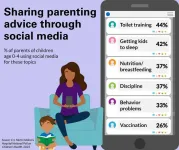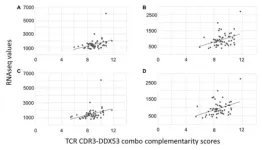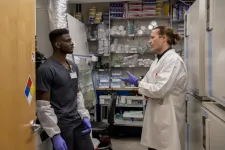(Press-News.org) New research reveals that with each subsequent generation of Mexican Americans, the risk of developing liver cancer has climbed. Although Mexican Americans have experienced a growing trend in modifiable risk factors—such as increased alcohol consumption, higher smoking rates, and elevated body mass index—these factors alone do not entirely account for the increased risk of liver cancer as generations progress. The findings are published by Wiley online in CANCER, a peer-reviewed journal of the American Cancer Society.
US-born Latinos have a higher incidence of liver cancer than foreign-born Latinos, and a possible contributor may relate to the adoption of different lifestyle behaviors, cultural norms, and values in the United States. Assessing liver cancer rates in successive generations of Mexican Americans may help to determine whether this theory is potentially valid.
To investigate, a team led by V. Wendy Setiawan, PhD, of the University of Southern California, studied 31,337 self-reported Mexican Americans from the Multiethnic Cohort Study. A total of 213 new cases of liver cancer developed over an average follow-up of 19.5 years. After adjusting for lifestyle and neighborhood-level risk factors, second generation (US-born with one or two parents born in Mexico) and third generation (US-born with both parents born in the US) Mexican Americans had 37% and 66% higher risks of liver cancer, respectively, compared with first generation Mexican Americans, who were born in Mexico. The elevated risk associated with generational status was mostly observed in men.
“Liver cancer is becoming a growing concern among Latinos, underscoring the importance of comprehending the factors driving this trend. Although we currently lack a precise understanding of why second and third generation Mexican Americans are at a heightened risk of liver cancer, we have highlighted the importance of prioritizing research on these populations,” said Dr. Setiawan. “In the future, identifying the risk factors within this group may facilitate the discovery of the underlying causes behind these observations.”
Additional information
NOTE: The information contained in this release is protected by copyright. Please include journal attribution in all coverage. A free abstract of this article will be available via the CANCER Newsroom upon online publication. For more information or to obtain a PDF of any study, please contact: Sara Henning-Stout, newsroom@wiley.com
Full Citation:
“Increasing risk of hepatocellular carcinoma with successive generations in the United States among Mexican American adults: The Multiethnic Cohort.” Nicholas Acuna, Kali Zhou, Paulo S. Pinheiro, Iona Cheng, Salma Shariff‐Marco, Tiffany Lim, Lynne R. Wilkens, Christopher A. Haiman, Loïc Le Marchand, and Veronica Wendy Setiawan. CANCER; Published Online: November 20, 2023 (DOI: 10.1002/cncr.35000).
URL Upon Publication: http://doi.wiley.com/10.1002/cncr.35000
Author Contact: Hinde.Kast@med.usc.edu or Laura.LeBlanc@med.usc.edu
About the Journal
CANCER is a peer-reviewed publication of the American Cancer Society integrating scientific information from worldwide sources for all oncologic specialties. The objective of CANCER is to provide an interdisciplinary forum for the exchange of information among oncologic disciplines concerned with the etiology, course, and treatment of human cancer. CANCER is published on behalf of the American Cancer Society by Wiley and can be accessed online. Follow CANCER on Twitter @JournalCancer and Instagram @ACSJournalCancer, and stay up to date with the American Cancer Society Journals on LinkedIn.
About Wiley
Wiley is a knowledge company and a global leader in research, publishing, and knowledge solutions. Dedicated to the creation and application of knowledge, Wiley serves the world’s researchers, learners, innovators, and leaders, helping them achieve their goals and solve the world's most important challenges. For more than two centuries, Wiley has been delivering on its timeless mission to unlock human potential. Visit us at Wiley.com. Follow us on Facebook, Twitter, LinkedIn and Instagram.
END
Liver cancer rates are rising with each successive generation of Mexican Americans
Uptake of unhealthy behaviors does not fully explain the trend.
2023-11-20
ELSE PRESS RELEASES FROM THIS DATE:
Liver cancer rates increase in each successive generation of Mexican Americans, study finds
2023-11-20
In the United States, liver cancer rates have more than tripled since 1980. Some groups, including Latinos, face an even higher risk than the general population—but researchers do not fully understand why.
A study from the Keck School of Medicine of USC, funded by the National Cancer Institute, has shed new light on those disparities. Researchers found that among Mexican Americans, liver cancer risk rises the longer a person’s family has lived in the U.S. That increased risk primarily affected men. The ...
National Poll: Parents of young children increasingly turn to social media for parenting advice
2023-11-20
ANN ARBOR, Mich. – Potty training, getting kids to sleep and toddler tantrums are just some of the challenges parents of young children face.
And four in five parents in a new national poll say they go to the same place to discuss such parenting issues: social media.
Nearly half of parents rate social media as very useful for getting new ideas to try, according to the University of Michigan Health C.S. Mott Children’s Hospital National Poll on Children’s Health.
“Many parents turn to online communities ...
Reducing cyberattacks on Canadian health systems
2023-11-20
Cyberattacks targeting health information systems can cause considerable damage and stress, but there are ways to reduce the risk of these events, write authors in CMAJ (Canadian Medical Association Journal) https://www.cmaj.ca/lookup/doi/10.1503/cmaj.230436.
"With respect to cybersecurity, a bit of prevention is worth a terabyte of cure," writes Vinyas Harish, MD/PhD candidate at the University of Toronto's Temerty Faculty of Medicine, with coauthors, in an article outlining the impact of cyberattacks on Canadian health information ...
Alarming rates of suicidal ideation among older transgender adults revealed on Transgender Day of Remembrance
2023-11-20
Transgender adults aged 50 or older in the United States face a significantly elevated risk of contemplating suicide due to the compounding impact of various challenges in different areas of their lives, according to a population-wide study.
More than one-fourth (25.8%) of this large pool of older transgender people acknowledged having thought about ending their lives at least once the previous year.
That is a much greater prevalence than the 4.7% figure currently estimated for the adult population-at-large and substantially ...
Survey: from inflation to world affairs, stressors pile up for Americans this holiday season
2023-11-20
EMBARGOED UNTIL MONDAY, NOVEMBER 20 AT 12:01 A.M. EST
COLUMBUS, Ohio – The season of comfort and joy is upon us, but a new survey finds that for many Americans, it’s the season of stress and worry. A new survey commissioned by The Ohio State University Wexner Medical Center and College of Medicine finds Americans are feeling the strain from inflation and world affairs this year, in addition to other stressors that often come with the holidays.
Of the 1,007 survey respondents, 81% said that national issues and world affairs are causing them stress. In addition, 75% of respondents are ...
The way dogs see the world: Objects are more salient to smarter dogs
2023-11-18
When we point at an object, the toddler focuses on the object, while the dog usually takes the gesture as a directional cue. In a recent study, researchers from the Department of Ethology at Eötvös Loránd University find explanations for this phenomenon. It appears that the discrepancy is not only due to how dogs see, but may, in fact, reflect how they think. For "smarter" dogs, the appearance of an object matters as much as its location, suggesting that their information processing is more similar to that of humans.
Spatial bias is the phenomenon of interpreting information in relation to space, location ...
A potential early esophageal cancer antigen: DDX53
2023-11-17
“In this ESCA study, the possibility of an immune response that selected for tumor cells lacking the DDX53 CTA is discussed.”
BUFFALO, NY- November 17, 2023 – A new research paper was published in Oncoscience (Volume 10) on November 10, 2023, entitled, “An immunoinformatics assessment of the cancer testis antigen, DDX53, as a potential early esophageal cancer antigen.”
T-lymphocytes have been implicated in facilitating a pro-inflammatory, pro-tumorigenic microenvironment that worsens prognosis for esophageal carcinoma (ESCA). In their new study, researchers ...
TTUHSC’s La-Beck to study cancer drug delivery via nanoparticles
2023-11-17
To reduce the side effects associated with chemotherapy treatments, researchers have investigated the use of delivery systems that can take more drugs directly to the tumor. Ninh (Irene) La-Beck, Pharm.D., from the Department of Immunotherapeutics and Biotechnology at the Texas Tech University Health Sciences Center (TTUHSC) Jerry H. Hodge School of Pharmacy is one of those researchers.
La-Beck recently received a five-year, $2.49 million grant (“Cholesterol Metabolism in the Pharmacology of Liposomal ...
NASA researcher honored by Goddard Tech Office for earth science work
2023-11-17
Earth science researcher Dr. Antonia Gambacorta earned the 2023 Goddard IRAD Technology Leadership award for pioneering new ways to measure lower layers of Earth’s atmosphere from space.
The award from the chief technologist of NASA’s Goddard Space Flight Center in Greenbelt, Maryland, recognizes Gambacorta’s work demonstrating how hyperspectral microwave sounding, the measurement of hundreds of thousands of wavelengths of microwave light, could dissect Earth’s atmospheric planetary boundary layer (PBL). She also ...
Mass Eye and Ear researchers develop potential glaucoma treatment strategy to guide stem cells to the retina
2023-11-17
BOSTON – Glaucoma is one of the leading causes of blindness worldwide, and vision loss, due to the loss of retinal ganglion cells (RGCs), cannot currently be reversed with any treatment. Some studies have looked at replacing RGCs through cell transplants, but this process is still in the research and development stage and fraught with limitations that highlight a need for a more precise manner of effectively repopulating these cells in the retina. Now, a multidisciplinary team led by researchers at the Schepens Eye Research Institute of Mass Eye and Ear has ...
LAST 30 PRESS RELEASES:
Four NYU faculty win Sloan Foundation research fellowships
Personal perception of body movement changes when using robotic prosthetics
Study shows brain responses to wildlife images can forecast online engagement — and could help conservation messaging
Extreme heat and drought at flowering could put future wheat harvests at risk
Harlequin ichthyosis: a comprehensive review of pathogenesis, diagnosis, and management
Smithsonian planetary scientists discover recent tectonic activity on the Moon
Government censorship of Chinese chatbots
Incorporating a robotic leg into one’s body image
Brain imaging reveals how wildlife photos open donor wallets
Wiley to expand Advanced Portfolio
Invisible battery parts finally seen with pioneering technique
Tropical forests generate rainfall worth billions, study finds
A yeast enzyme helps human cells overcome mitochondrial defects
Bacteria frozen in ancient underground ice cave found to be resistant against 10 modern antibiotics
Rhododendron-derived drugs now made by bacteria
Admissions for child maltreatment decreased during first phase of COVID-19 pandemic, but ICU admissions increased later
Power in motion: transforming energy harvesting with gyroscopes
Ketamine high NOT related to treatment success for people with alcohol problems, study finds
1 in 6 Medicare beneficiaries depend on telehealth for key medical care
Maps can encourage home radon testing in the right settings
Exploring the link between hearing loss and cognitive decline
Machine learning tool can predict serious transplant complications months earlier
Prevalence of over-the-counter and prescription medication use in the US
US child mental health care need, unmet needs, and difficulty accessing services
Incidental rotator cuff abnormalities on magnetic resonance imaging
Sensing local fibers in pancreatic tumors, cancer cells ‘choose’ to either grow or tolerate treatment
Barriers to mental health care leave many children behind, new data cautions
Cancer and inflammation: immunologic interplay, translational advances, and clinical strategies
Bioactive polyphenolic compounds and in vitro anti-degenerative property-based pharmacological propensities of some promising germplasms of Amaranthus hypochondriacus L.
AI-powered companionship: PolyU interfaculty scholar harnesses music and empathetic speech in robots to combat loneliness
[Press-News.org] Liver cancer rates are rising with each successive generation of Mexican AmericansUptake of unhealthy behaviors does not fully explain the trend.






